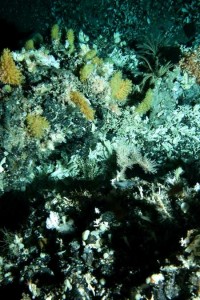Scientists who explore the deep reaches of the oceans are gathering in New Zealand to share cutting edge research. The Deepsea Coral Symposium, taking place in Wellington this week, is bringing researchers from Asia, Europe, Australasia, North and South America together to discuss the issues facing one of the most unusual and least understood ecosystems on Earth.
We’ve asked two of the scientists involved in the symposium to comment on the importance of cold water coral reefs.
Dr Malcolm Clark, National Institute of Water and Atmospheric Research (NIWA) says:
“Mention coral reefs, and most people think of tropical islands and areas like the Great Barrier reef. But deepsea corals extend way beyond these shallow waters. They don’t need the photosynthetic algae associated with the coral species that limits the shallow ones to sunlight waters. They occur to great depths, over 1.5 km down, where there is total darkness and they feed by extending polyps and catching suspended particulate matter as it is swept past in deep ocean currents.They occur throughout the worlds oceans, and around New Zealand are often found on the summits and upper flanks of seamounts-underwater volcanoes. They form a dense matrix which is home for a large number of other animals, and hence provide an important habitat structure in the deep-sea.
“There are three main threats to these corals. The first two are direct human activities, deepsea fishing (bottom trawling in particular) and potential deepsea mining. The coral reefs are fragile, and are easily broken by the heavy fishing gear used by large trawlers on seamounts. Interest in deepsea mining for precious metals and important minerals like copper is increasing, and this could involve large-scale removal of areas of the seafloor. In addition, disturbed sediment can smother the delicate feeding polyps. management and conservation of corals against these threats has increased a lot in recent years, and a number of seamounts around New Zealand are closed to bottom fishing to protect corals and their associated biodiversity.
“The third threat is climate change. Corals rely upon a type of calcium carbonate to form their skeletons, and as more and more carbon dioxide is absorbed into the oceans (making them more acidic) this function is affected. So future distribution of deepsea corals and their communities would be more restricted, and whole communities may actually die out, with a flow on affect into the structure and function of some deepsea ecosystems.”
Dr Helen Neil, National Institute of Water and Atmospheric Research (NIWA) says:
Climate monitors.
“Like several other coral groups, bamboo corals develop prominent growth rings, which can be used to determine their age. Counts of zones of a cross section of a bamboo coral showed ages of at least 400 years old for NZ bamboo corals.
Readable growth rings make bamboo corals extremely useful to scientists researching past oceanic conditions. These rings like those of trees, enable them to establish when any crucial physical or chemical changes occurred. They provide and unprecedented opportunity to access century-long records at annual resolution of climate from the deep ocean.”
Ocean acidification.
“Deepsea corals are an organism that could be affected by less alkaline waters as CO2 deposition increases. Oceans are slightly alkaline, pH8.06. The term ‘ocean acidification’ refers to the process of moving toward the acid end of the scale. The mineral availability required for coral growth will start decreasing from the bottom of the ocean and continue toward the surface. Hence deepsea corals are likely to be one of the first ecosystems to experience its effects. As oceans move towards increasing acidity the coral calcifying structures grow slower, become weaker and even dissolve. This comes at a time when improved deep-ocean technologies have only recently allowed an exponential increase in scientific research on cold-water coral ecosystems. Scientists are now finding new and unique deepsea coral communities throughout the world’s oceans.”
To talk to these or other relevant scientists on this topic, please contact the Science Media Centre on tel: 04 499 5476 or email: smc@sciencemediacentre.co.nz.
Notes to the Editor:
The Science Media Centre (SMC) is an independent source of expert comment and information for journalists covering science and technology in New Zealand. Our aim is to promote accurate, bias-free reporting on science and technology by helping the media work more closely with the scientific community. The SMC is an independent centre established by the Royal Society of New Zealand with funding from the Ministry of Research, Science and Technology. The views expressed in this Science Alert are those of the individuals and organisations indicated and do not reflect the views of the SMC or its employees. For further information about the centre, or to offer feedback, please email us at smc@sciencemediacentre.co.nz.
